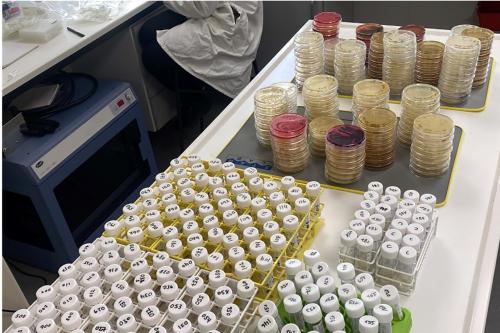What is the problem?
Antimicrobial resistance (AMR) occurs when microorganisms become resistance to drugs used to control or eradicate them. These drugs arguably paved the way for our modern lifestyle, where infections can be routinely treated and controlled to the point many are considered minor. It has also allowed complicated surgeries to be carried out without the risk of infection.
Antimicrobial drugs are also equally useful in animal health and in crop protection to control diseases and harmful pathogens. The problem is that in a never ending biological arms race, the microbes can become resistant, requiring higher doses or alternatives, leaving few options left on the horizon.
The WHO has generated a global action plan to tackle AMR and individual nations (including the UK) have adopted the framework to create their own national action plans. These plans contain a series of commitments to help guide governments on what needs to be achieved. However, the AMR problem is extremely large and complex, spanning multiple disciplines from social sciences and policy to fundamental bioscience. AMR is a truly ‘One Health’ issue and it requires input from stakeholders across human, animal, environment, crop and food sectors. Such a wide range of activities is actually making it difficult to get an overview of the research being undertaken in order to try and tackle the issues associated with AMR.
What can we do to help?
This project was initially developed through SEFARI led Scottish Government funded strategic research, which mapped AMR-related projects and expertise and was shared in the One Health congress in 2020 (Edinburgh). Then in 2021 we collated research activities from the last five years, which were associated with AMR and linked to Scotland directly (i.e. carried out in Scotland) or with Scottish involvement.
Our work generated a register of activities, termed the Scottish One Health AMR Register (SOHAR) and it became clear quite quickly that this resource had great potential to help individuals and organisations to readily find out about the myriad of AMR research activities linked to Scotland. It also appeared that Scotland was the first of the four nations to do this, with only a few other examples elsewhere, e.g. a global dashboard for investments and product development or platforms available from the EU-funded Joint Programming Initiative on Antimicrobial Resistance (JPIAMR).
However, to realise the potential of the register and allow easy access, we realised the register needs to be converted into an online resource with search capability. Our aim is to have the register as an online tool on AMR research activities that is accessible to all and updated on a regular basis. Therefore, we first needed to scope out the requirements to achieve this and applied for SEFARI Gateway support to help.
What happened?
Although we already had the register, it was only accessible in a basic tabular format and only represented a snapshot from the original data collection. Re-examination of the data showed us what was needed to refine the register for consistency and easier searching, enabling us to make and test 2 prototypes of the register - in effect working models of how the data could be used. As part of the project we also talked to web-designers to work out the best way of presenting and updating the register in the future.
Images from the prototypes / working models
The dataset displayed as a table:
The data can be filtered by the type of work carried out, its main category or theme (e.g., food), funder, or organisation and individuals associated with the work.
In addition, the data can also be displayed graphically, and provide results based on the selection of different topics, e.g., under the category of ‘Environment’:
An alternative prototype produced a similar overall table of results in a different format:
which can be searched in a similar manner, e.g., for activities in the category ‘Disease & Surveillance’ and activity type ‘Funded projects’:
Both prototypes output the data from a single source database into different formats, and both display detailed records or pop-out ‘tooltips’. The prototypes showed us the source database is flexible enough to be used on a range of platforms and it is now ready to be adopted as a web-based resource.
What is next?
As we have seen the prototypes demonstrate we can now create an online AMR resource with search capability and the data collection template has been updated to reflect the project findings based on data quality and cleansing.
Collection of new data to keep the register up to date requires individuals with the appropriate expertise, and needs to consider data curation and be independent reviewed. We would recommend updates on a twice annual basis to reflect new developments and outputs in the AMR field.
Long-term security and maintenance is also needed for the website to be hosted securely.
Finally, we will share our experience and the lessons we have learnt during this project at SEFARI Gateway’s Leading Ideas Hub in September – so come and hear more then!
Nicola Holden (SRUC), lead Investigator, Eleanor Watson (Moredun), Co-Investigator, Karen Scott (Rowett), Co-Investigator, Jennifer Volk (SRUC), data analyst and Paul Jamieson (SRUC), data analyst.
